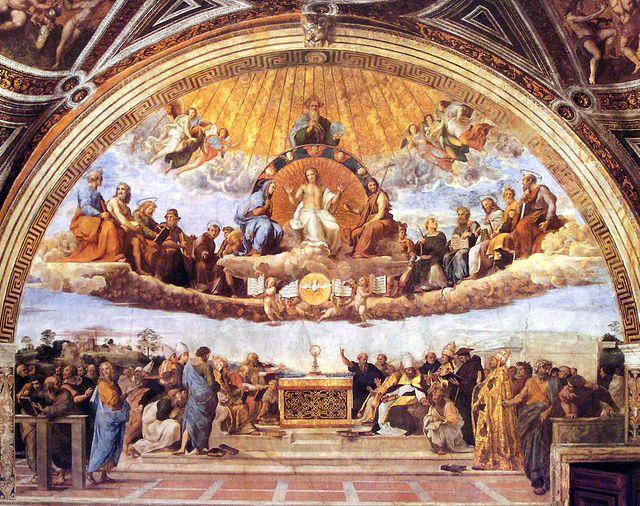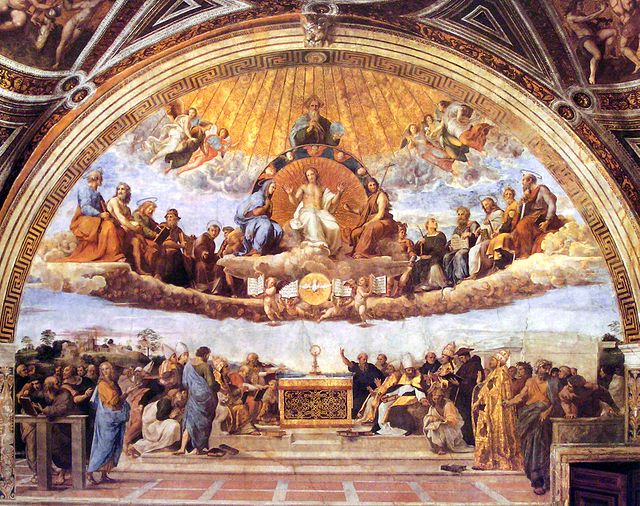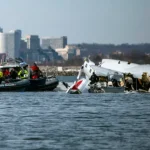

Photo Credit:Raphael, Public domain, via Wikimedia Commons
Wikimedia
Under the threat of annihilation from relativist secularism in conjunction with absolutist Islamism, Christianity in the West may deep down yearn for reconciliation with Christianity in the East.<img alt="Raphael, Public domain, via Wikimedia Commons" captext="Wikimedia” src=”https://conservativenewsbriefing.com/wp-content/uploads/2025/01/nostalgia-and-pragmatic-idealism.jpg”>
Raphael’s Disputation of Holy Sacrament, Public Domain
The Great East-West Schism in Christianity dates to 1054. Not acknowledged by any but a few, given the repression of shared memories from a Christian past, the consequences of this rupture remain significant to our self-understanding as Christians.
It requires joint reflection to get in depth and understand how that break of communion so long ago has affected us ever since. As with the psychoanalysis of an individual, who is floundering through life, seemingly aimless and unhappy, the hope for our civilization lies in the courage of earnest self-examination: we must piece together the fragments of the collective unconscious into a meaningful narrative of who we are — and, not least, why we should adhere to our way of living.
In the West, where many have given in to materialism and renounced spirituality, we need to find our way back to our roots. It seems that our fellow believers, who suffer every day for their faith, condemned to live as second-class citizens in landscapes invaded by outside tribes, have something valuable to share with us. It is about humility, sincerity, and closeness to God.
So, in retrospect, as a warning of further calamities to follow, Greek and Latin speakers went their separate ways. Thus, considering the fatal threats that lurked southeast of Constantinople, growing year by year, the fraternal feud in the Christian family would seem highly unreasonable, not to say suicidal. As recorded, the break was due to an amalgam of theological and ecclesiastical disputes, including the question of “papal primacy”.
While the Catholic Church, committed to a strictly hierarchical organization, had its papal headquarters in Rome, the Orthodox Church reported to the ecumenical patriarch of Constantinople, defined as “first among equals”. The deadline eventually turned out to be four centuries before the disaster occurred. In 1453, the metropolis at the bridge to the Orient, overlooked by Hagia Sophia, fell after a 55-day siege by an Ottoman (Turkish) army.
Orthodox Christians were not the only victims trapped behind enemy lines as Arabs and Turks pushed ahead by turns and conquered their lands. For centuries, a number of Christian communities (e.g. Armenian, Assyrian, and Maronite) founded in the time of the Roman Empire managed to survive in Anatolia and the Levant despite continued persecution, enslavement, and decimation.
Now, however, time is running out for the pre-Islamic minorities. Neither Catholics nor Protestant-Anglicans in the West, whose populist leaders lack both faith and historical insight, take it upon themselves to effectively protest violations of human rights and ethnic cleansing.
Modern-day ignorance of the suffering that has befallen Christians for a thousand years as victims of Islamic expansion leaves a void to be filled with malicious, false claims of original ownership by others of not only the Levant, but also Anatolia and North Africa — indeed, the rest of the world for that matter.
Arguably the closest to assume spiritual leadership, coming to the rescue of their Orthodox “brothers and sisters in Christ”, patriarchs of Moscow (i.e. the so-called “Third Rome”) have never shown any interest in recapture of assets lost to the enemies of Christendom. Rejecting the “universal and supreme jurisdiction” of the pope, which represented a tactical concession made in return for Western military aid, the Russian Orthodox Church broke with the ecumenical patriarchate of Constantinople in 1448. However, when Western reinforcements proved to be completely inadequate in the war with the Turks, leaving the metropolis vulnerable to siege, its citizens prayed in vain for signs of Moscovian leverage.
By and large, the attitude to the Eastern Roman (Byzantine) tragedy unfolding since the Battle of Kosovo (June 15, 1389), where invading Turks defeated a Christian army of Serbs, Romanians, and Bulgarians, has been indifferent shrugging or impotent hand-wringing. Since the Crusades, nobody has seriously undertaken to organize the joint resistance against barbarians threatening our very civilization.
After the collapse of Bolshevism, nostalgics intensely hoped for the Russian Orthodox Church to revive and enter a new era of glory. At any rate, construction of churches and monasteries took off all over Russia, reinforcing the expectation of full institutional restoration. On the site of an outdoor bath, the Moscow Pool, where the Cathedral of Christ the Savior had stood before it was blown up on the orders of Joseph Stalin in 1931, a replica was thus rebuilt in record time (1995–2000).
Indeed, determined to persecute “reactionary” believers and destroy their houses of prayer, Stalin earned in every thinkable way his place as a modern Antichrist. At the hands of Nicolae Ceaușescu, another Marxist tyrant, whose social engineering involved brutal oppression, impoverishment, and vandalism of cultural heritage, central Bucharest was demolished to make way for a gigantic palace. On a hill nearby, the largest shrine of the Orthodox Church, the People’s Redemption Cathedral, is currently being built. As such, the theatrical backdrop for liturgical rituals is truly moving.
A testament to the ignorance that characterizes younger generations in the West, the narrative that the Crusaders were Christian “colonizers” has gained traction. This interpretation is patently false. A fake. To be sure, it is the other way around. Several Christian lands, but also Zarathustrian Persia, were conquered by Muslims originating in the Arabian Peninsula. The Holy Land and the rest of the Levant were conquered by armies of the Rashidun Caliphate. Extensive conquests followed in West Africa and on the Iberian Peninsula under the Umayyad Caliphate. Later yet, spearheading jihad, Turkish tribes broke into Anatolia and smashed millennia-old Greek communities.
As the capstone of Islamic conquests in the old world, millions of Arabs and Turks are now flooding Western Europe as asylum seekers or — exploiting unimaginably lenient laws — relatives of other immigrants. At the same time, original Europeans are becoming fewer and fewer. They have given up faith in the future. Starting a family and bringing children into the world seems hopeless. The mood of the West is distinctly melancholic. From Norway in the North to Spain in the South, churches close because of the relativist secularism that has tragically robbed Westerners of the will to thrive and survive.
In reality, it is a tragedy that surviving parts of the Orthodox Church in Europe neglect fellow believers in Anatolia and the Levant. Likewise, it is outrageous that pampered, ideologically depraved Westerners of Christian descent pretend to be on friendly terms with Muslim authorities in the Middle East despite the ongoing persecution of Christian minorities. Christians should join forces and defend their civilization against the common enemy. However, the problem is that they lack a true leader, a unifying voice.
Unlike John Paul II and Benedict XVI, the current pope in Rome, Francis, is a Marxist, morally objectionable, and unfit to lead the Christians. Succumbing to relativism, Protestant bishops primarily identify as academics and hardly count as Christians by conviction; on the contrary, they are government officials with a taste for comfort.
Nor do Anglican bishops have anything to show for it but apologies for the alleged sins of Christendom and support for the campaign against “social injustice” in the Third World. Showing true courage and fighting for those, who die for their faith in the Middle East and beyond, is unthinkable for them. Complacent to their fingertips, they are not warriors, but chroniclers, if anything.
Finally, Orthodox patriarchs have little commanding authority outside the narrowest circle of clerical secretaries and functionaries. Walking in procession, they come across as grieving specters, politically isolated or cynically exploited as pawns in the geostrategic power games of others.
Jesus was truly no bloodthirsty warlord but turned the other cheek and endured pain. Self-surrendering in the compassionate way (i.e. rather than hatefully murdering others in the very act of “sacrifice”), Christian martyrs also made themselves available for pain. As Christians, however, we have to stand firm on justice and cannot pretend that our life in this world does not oblige us to moral actions other than to refrain from “mortal sins”.
We are not philistines, paralyzed hypocrites, but “soldiers in the heavenly army on earth”. Not fatalism in the death camps, but armed resistance, broke the Nazis in 1945. Not apathy of the enslaved masses, but intellectual rebellion (in the context of socio-economic collapse), broke the Bolsheviks in 1991.
What does it take to stand up against the enemies of civilization in our time? For sure, crying prayers cannot stand alone.





